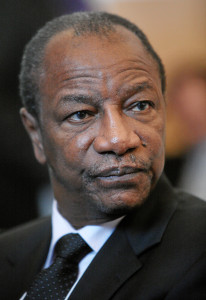Guinea’s Tenuous But Peaceful Elections Offer Hope
In a year that has been critical for African democracy, Guinea’s elections last week were far from perfect. Observers reported problems with voter registration and availability of ballots, moreover, violent clashes left several dead. However, when the dust settled, incumbent president Alpha Condé came through with a decisive 58% of the vote. Despite calls by opposition leader Cellou Dalein Diallo for a cancellation of the results, the election outcome has largely been ruled as valid by observers. In its second-ever elections since independence, Guinea has demonstrated tremendous progress in strengthening its democratic institutions. This comes at an especially precarious time for the West African nation, as commodity prices slumped and Guinean society endures its recovery from the Ebola epidemic. This outcome, however, shows that Guinea’s democracy is resilient and capable of long-term stability.
Guinea’s elections must be viewed in the larger context of its tumultuous political history. Since independence in 1958, Guineans witnessed one military coup after another, despite attempts to return to democratic rule. The first full election was held in 2010, marking Condé’s rise to power. The highly contested elections pitted Condé and his rival Diallo against each other, and tensions following a second-round of voting resulted in a wide-scale outbreak of violence. The military was forced to declare a state of emergency to stabilize the country, but riots nonetheless resulted in over 300 injured and four dead. Inter-ethnic competition was partially to blame: Condé’s Malinké and Diallo’s Fulani are the two biggest ethnic groups in the country, constituting 70 percent of the population. Since then, contention over the results of the delayed 2013 parliamentary elections has led to the deaths of an additional 50 people.
Given Condé and Diallo’s rematch this October, emotions were bound to run high. To complicate the situation further, plummeting commodity prices have hit Guinea’s $6.6 billion economy hard. During the campaign, Condé vowed to complete two major projects with Rio Tinto and China International Water & Electric Corp. In order to expand the country’s iron ore and bauxite production. Opposition parties, however, called out the government's overbearing bureaucratic regime, which has scared away much-needed foreign investment. Even before the crippling Ebola outbreak, the economy under Condé posted low levels of growth, with poverty rates actually rising.
Despite the circumstances, Condé performed even better than in the previous election, winning decisively. Some attribute his success to his utilizing the country’s democratic system to establish inter-ethnic alliances. In 2010, Condé placed second in the first round of voting, gaining 21 percent of the votes against Diallo’s 40 percent. However, he won against Diallo in the second round by garnering support from 12 other political parties. This strategy seems to have helped him again in 2015. Condé knew that he could not win by just relying on the votes of his Malinké group alone, as they consist of just 30 percent of the population. He apparently pushed for support from the dozen or so other groups in uniting many of them against Diallo's Fulani, who make up 40 percent of Guineans. Condé’s ability to consolidate his votes early on this year may be reflected by the fact that 16 fewer candidates competed in the first round compared to 2010.
The biggest issue in establishing institutional legitimacy is continuity. Given the electoral issues that occurred in 2010 as well as the various economic and social problems afflicting Guinea this year, the stability of these elections took was crucial. With substantially less violence than the last time and independent verification of the results, Guinea’s democracy appears to be holding strong.
From a wider perspective, Guinea’s elections built on the democratic successes of other African countries earlier this year. Zambia’s Edgar Lungu was elected through an impromptu election following President Michael Sata’s death and several months of political infighting. The Burkinabé refused to let former President Blaise Compaoré return to power, dismantling a coup attempt and setting the stage for fresh elections in November. And of course, Muhammadu Buhari ascended to the presidency in Nigeria’s first-ever peaceful transition of power. These many cases are positive signs that democratic rule of law in Africa has become less of an aspiration and more of a permanent fixture of state institutions.

